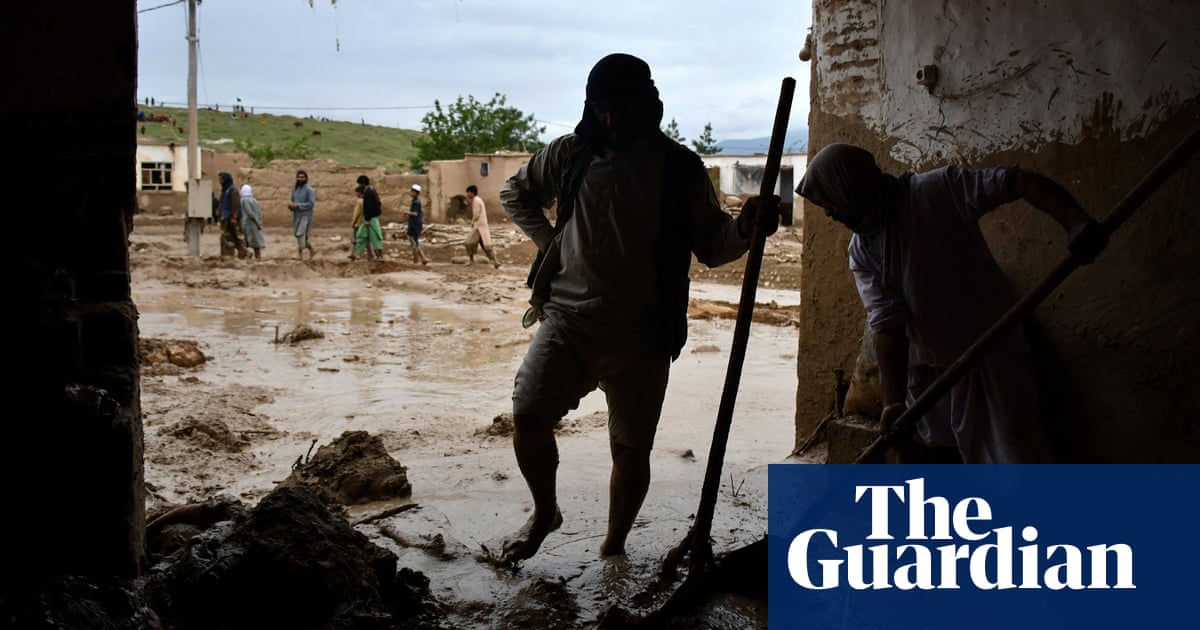
The United Nations World Food Program said that more than 300 people were killed in flash floods that swept several provinces in Afghanistan, while the authorities declared a state of emergency and rushed to rescue the injured.
Several people were still missing after heavy rains on Friday sent roaring rivers of water and mud flowing through villages and farmland in several provinces, causing what one aid organization described as a “major humanitarian emergency.”
Survivors moved through muddy streets filled with debris and damaged buildings on Saturday, while authorities and non-governmental organizations deployed rescue workers and aid, warning that some areas would be isolated due to the floods.
The northern province of Baghlan was one of the worst affected areas, with more than 300 people killed there alone, and thousands of homes destroyed or damaged, according to the World Food Programme.
“Based on current information: in Baghlan province, there are 311 dead, 2,011 homes destroyed and 2,800 homes damaged,” said Rana Diraz, communications officer at the UN agency in Afghanistan.
There were discrepancies between death tolls provided by the government and humanitarian agencies.
The United Nations International Organization for Migration said on Saturday that 218 people had died in Baghlan. Interior Ministry spokesman Abdul-Matin Qani told AFP that 131 people were killed in Baghlan, but the government toll may rise.
“Many people are still missing,” he added.
He added that 20 other people died in the northern Takhar province and two in neighboring Badakhshan.
“Hundreds of our citizens have died in these catastrophic floods,” Taliban government spokesman Zabihullah Mujahid said on Twitter.
He added: “The flood caused widespread damage to residential properties, leading to significant financial losses.”
Officials said heavy rains caused severe damage in Baghlan, Takhar, and Badakhshan, as well as western Ghor and Herat provinces, in a poverty-stricken country that relies heavily on agriculture.
“The floods washed away my house and my whole life,” said Jan Muhammad Din Muhammad, a resident of Baghlan’s provincial capital, Paul-e-Khamri.
He said his family managed to escape to higher ground, but when the weather cleared and they returned home, “there was nothing left, all my belongings and my house were destroyed.”
“I don’t know where to take my family… I don’t know what to do.”
Emergency personnel rushed to rescue the injured and stranded Afghans. The Air Force said it began evacuations as skies cleared on Saturday, adding that more than 100 injured people had been taken to hospital.
By declaring a state of emergency in… [affected] She added that the Ministry of National Defense began distributing food, medicines and first aid to those affected in the regions.
A car loaded with food and water was seen in the central Baghlan area of Baghlan, in addition to others carrying the dead to bury them.
The Secretary-General of the United Nations, António Guterres, expressed his solidarity with the people of Afghanistan [and] His spokesman Stephane Dujarric said: “He offers his condolences to the families of the victims,” adding that the United Nations is working with local authorities to provide assistance.
The International Rescue Committee (IRC) was also preparing for a rapid response, adding that the floods should serve as a “wake-up call” to remind world leaders and donors not to forget a country devastated by decades of conflict and reeling from natural disasters.
“These recent floods have caused a major humanitarian emergency in Afghanistan, which continues to suffer from a series of earthquakes” this year and severe floods in March, said Salma Benaissa, country director of the International Rescue Committee.
Since mid-April, floods and other inundations have killed about 100 people in 10 Afghan provinces, authorities said.
It has flooded farmland in a country where 80% of the population of more than 40 million depends on agriculture for survival.
Afghanistan – which has had a relatively dry winter, making it difficult for the soil to absorb rainfall – is highly vulnerable to climate change.
The country, devastated by four decades of war, is one of the poorest countries in the world and, according to scientists, one of the worst prepared to face the consequences of global warming.
The UN special rapporteur on human rights in Afghanistan, Richard Bennett, said on Twitter/X that the floods were a “stark reminder of Afghanistan’s vulnerability to the climate crisis.”
“Immediate aid and long-term planning are needed by the Taliban and international actors,” he added.

“Travel specialist. Typical social media scholar. Friend of animals everywhere. Freelance zombie ninja. Twitter buff.”





More Stories
Macron rejects left-wing bid to appoint PM before Olympics
Dogs can smell human stress and make decisions accordingly, study says: NPR
Hamas and Fatah sign declaration to form future government as war rages in Gaza